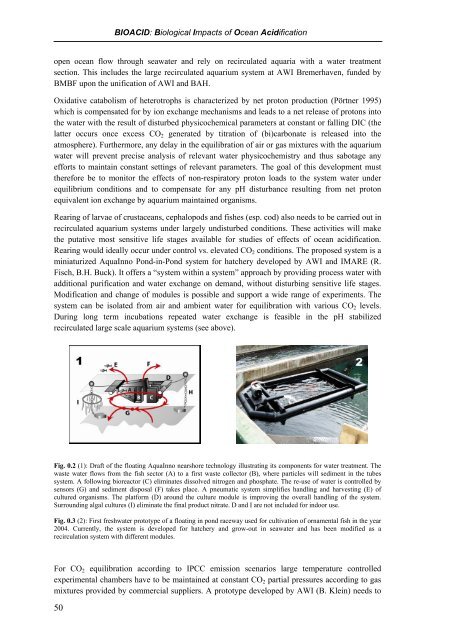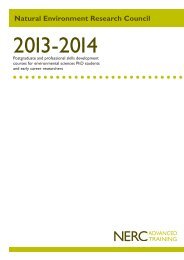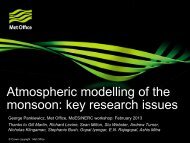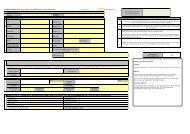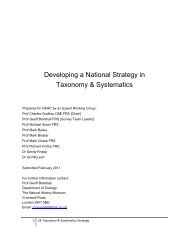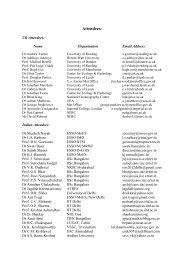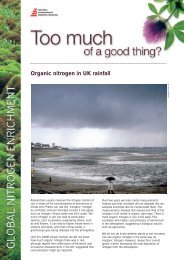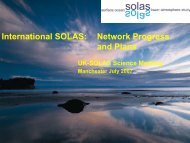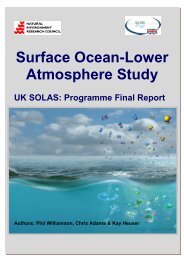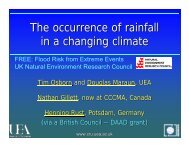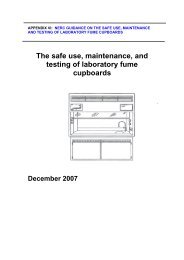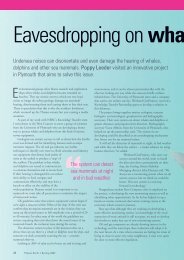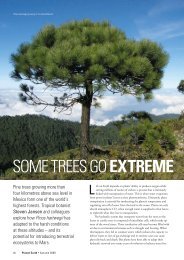BIOACID Programme - Natural Environment Research Council
BIOACID Programme - Natural Environment Research Council
BIOACID Programme - Natural Environment Research Council
You also want an ePaper? Increase the reach of your titles
YUMPU automatically turns print PDFs into web optimized ePapers that Google loves.
50<br />
<strong>BIOACID</strong>: Biological Impacts of Ocean Acidification<br />
open ocean flow through seawater and rely on recirculated aquaria with a water treatment<br />
section. This includes the large recirculated aquarium system at AWI Bremerhaven, funded by<br />
BMBF upon the unification of AWI and BAH.<br />
Oxidative catabolism of heterotrophs is characterized by net proton production (Pörtner 1995)<br />
which is compensated for by ion exchange mechanisms and leads to a net release of protons into<br />
the water with the result of disturbed physicochemical parameters at constant or falling DIC (the<br />
latter occurs once excess CO2 generated by titration of (bi)carbonate is released into the<br />
atmosphere). Furthermore, any delay in the equilibration of air or gas mixtures with the aquarium<br />
water will prevent precise analysis of relevant water physicochemistry and thus sabotage any<br />
efforts to maintain constant settings of relevant parameters. The goal of this development must<br />
therefore be to monitor the effects of non-respiratory proton loads to the system water under<br />
equilibrium conditions and to compensate for any pH disturbance resulting from net proton<br />
equivalent ion exchange by aquarium maintained organisms.<br />
Rearing of larvae of crustaceans, cephalopods and fishes (esp. cod) also needs to be carried out in<br />
recirculated aquarium systems under largely undisturbed conditions. These activities will make<br />
the putative most sensitive life stages available for studies of effects of ocean acidification.<br />
Rearing would ideally occur under control vs. elevated CO2 conditions. The proposed system is a<br />
miniaturized AquaInno Pond-in-Pond system for hatchery developed by AWI and IMARE (R.<br />
Fisch, B.H. Buck). It offers a “system within a system” approach by providing process water with<br />
additional purification and water exchange on demand, without disturbing sensitive life stages.<br />
Modification and change of modules is possible and support a wide range of experiments. The<br />
system can be isolated from air and ambient water for equilibration with various CO2 levels.<br />
During long term incubations repeated water exchange is feasible in the pH stabilized<br />
recirculated large scale aquarium systems (see above).<br />
Fig. 0.2 (1): Draft of the floating AquaInno nearshore technology illustrating its components for water treatment. The<br />
waste water flows from the fish sector (A) to a first waste collector (B), where particles will sediment in the tubes<br />
system. A following bioreactor (C) eliminates dissolved nitrogen and phosphate. The re-use of water is controlled by<br />
sensors (G) and sediment disposal (F) takes place. A pneumatic system simplifies handling and harvesting (E) of<br />
cultured organisms. The platform (D) around the culture module is improving the overall handling of the system.<br />
Surrounding algal cultures (I) eliminate the final product nitrate. D and I are not included for indoor use.<br />
Fig. 0.3 (2): First freshwater prototype of a floating in pond raceway used for cultivation of ornamental fish in the year<br />
2004. Currently, the system is developed for hatchery and grow-out in seawater and has been modified as a<br />
recirculation system with different modules.<br />
For CO2 equilibration according to IPCC emission scenarios large temperature controlled<br />
experimental chambers have to be maintained at constant CO2 partial pressures according to gas<br />
mixtures provided by commercial suppliers. A prototype developed by AWI (B. Klein) needs to


